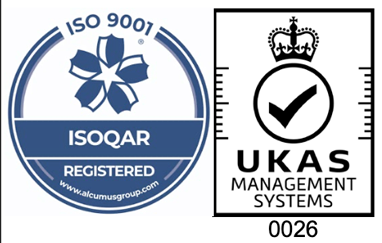The Different Types of Synthetic Rubber
23rd July, 2025
Synthetic rubber is the umbrella term given to any man-made elastomer. It shares many characteristics with natural rubber, meaning it is a suitable alternative for applications which typically use natural rubber, but synthetic rubber is made in a factory, whereas natural rubber is found in the sap of rubber trees.
Synthetic rubber manufacturers make up part of a global effort to make rubber production more sustainable because they use polymers synthesised from petroleum byproducts as base compounds.
This guide will outline all of the synthetic rubber offerings available from Aquaseal, including the main properties of synthetic rubber before outlining the characteristics of each and most common uses.
Properties of synthetic rubber
The properties of natural and synthetic rubber are similar, since synthetic rubbers are used to mimic natural rubber in a range of applications.
Synthetic rubber is chosen by experts in the rubber industry, including many of our customers at Aquaseal, because:
- It is resistant to certain chemicals, oils and solvents, making it suitable for rubber seals, rubber gaskets and hoses and tubing
- It is resistant to weather conditions, ozone and UV radiation, making it suitable for outdoor seals exposed to sunlight and harsh environments, like in the oil and gas industries
- It is resistant to water, making it a common choice for offshore and wind energy applications like wind farms and vessels
- It has low-temperature flexibility and heat resistance, meaning it can be used in environments with a wide temperature range
The synthetic rubber production process uses a range of synthetic rubber types to create products suitable for a range of applications, because of these properties.
At Aquaseal Rubber, we offer synthetic rubber made from the following materials to our clients, and provide guidance to ensure the best synthetic rubber option is used for each specific project.
PVC
Polyvinyl chloride (PVC) is a frequently used synthetic plastic polymer. It is a thermoplastic polymer that can be either hard or flexible.
Due to its high operating temperature of approximately 60 degrees, flame retardancy, and a multitude of other advantageous properties, PVC is utilised in a wide variety of applications. Some of which include:
Polyurethane
The shore hardness of polyurethane can range anywhere from being softer than a pencil rubber to being harder than nylon, or anything in between.
Polyurethane can be made from a wide range of diisocyanates and polyols, allowing for a wide range of materials to be tailored to different purposes, such as:
- Shocks
- Isolators
- Rubber seals
- Cutting surfaces
- Rubber gaskets
Nitrile
Nitrile rubber is a synthetic rubber derived from acrylonitrile.
The qualities of this rubber vary depending on the composition, but it is known for its resistance to oil, fuel, and other chemicals. This means that Aquaseal Rubber’s moulded rubber products made with Nitrile are suitable for various industrial applications, including:
- Rubber tubing and hoses, for oil and fuel
- O-rings
- Rubber gaskets
- Watertight hatch seals
Neoprene
Neoprene is the trade name for a group of synthetic rubbers based on polychloroprene.
Neoprene rubber was initially created as an oil-resistant replacement for natural rubber. Neoprene rubber is resistant to ozone, sunlight, oxidation, and certain petroleum compounds. Water resistance, chemical resistance, resilience, and high tensile strength are just a few of the other advantages of this material.
Common uses for neoprene rubber include:
- Corrosion-resistant coatings
- Rubber gaskets
- Hoses
- Rubber sheeting
- Fabrications
Viton Rubber
Viton® is a registered trademark of Dupont Dow Elastomers L.L.C. and is an excellent choice for foodgrade rubber since it can tolerate high temperatures and is extremely durable. It is also non-toxic and odourless, which meets the requirements of food manufacturers.
It provides high-temperature stability, low compression set, and resistance to chemicals, oil, and ozone. Although Viton® was initially fabricated for the aerospace industry; this rubber compound is used in many industries. Examples of its usage include:
- Food manufacturing and packaging
- Expansion joints
- Seals
- Caulks, sealant and adhesive
- Sponge and foam
EPDM
Ethylene Propylene Diene Monomer (EPDM) is a synthetic rubber composed mostly of ethylene and propylene. The inclusion of a small amount of diene allows the rubber to be cured with sulphur, resulting in a chemical structure similar to that of an unsaturated polymer. EPDM rubber has similar qualities to Neoprene rubber.
Aquaseal Rubber uses EPDM synthetic rubber compounds for both general and speciality outdoor applications, such as:
- Steam hoses
- High-temperature resistant seals
- Electrical insulation
- Roll covers
- Rubber D Fenders
Styrene Butadiene Rubber
Styrene Butadiene Rubber (SBR) is well-known for its high abrasion resistance, crack endurance, and ageing properties. It also has a high compression set, is water resistant, and has excellent bonding and heat-aging qualities.
SBR is the most popular and inexpensive synthetic rubber compound, and it is utilised in a wide variety of industrial applications, such as
- Automotive rubber
- Marine rubber
- Fabrications
- Rubber sheeting
- Moulding
Butyl Rubber
Butyl rubber is currently one of the most popular synthetic rubber compounds on the market.
It is highly impervious to gas and moisture permeation. It is also resistant to oxygenated solvents, alkalis, flexing, and abrasion and can provide high energy absorption as well as electrical isolation. Butyl is also highly resistant to sunlight, ozone, heat ageing, animal and vegetable oils, ammonia, and countless other chemicals. Popular applications include:
- Stoppers for medical bottles
- Pharmaceutical supplies
- O-rings
- Inner tubes
- Moulding
Fluoroelastomers
Fluoroelastomers are utilised in a wide range of high-performance applications, including aerospace, automotive, and industrial.
This synthetic rubber compound offers premium, long-lasting reliability in even the harshest environments, making it suitable for:
- Rubber seals
- Marine Rubber
- Food-grade rubber
- Hoses and tubing
- Rubber extrusions
Silicone Rubber
Silicone rubber is an inorganic polymer composed of silicon and oxygen. With its long service life, this rubber compound is perfect for a wide range of industrial applications.
Typical custom silicone rubber products include:
- Insulators
- Rubber diaphragms
- Impact absorbers
- Seals
- Gaskets
Synthetic rubber from Aquaseal
At Aquaseal Rubber, we’re always looking for new ways to increase our sustainability levels by reducing the amount of non-renewable resources in our processes.
If you are looking for bespoke synthetic rubber solutions for your project or application, contact us today to see how we can support you.


